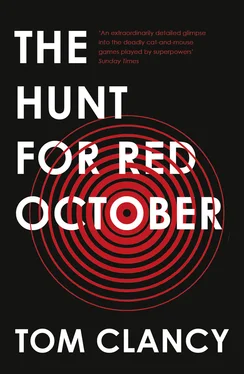‘Indeed, Ivan,’ Ramius replied with more good cheer than he felt. ‘Two weeks at sea. It is good to leave the dock. A seaman belongs at sea, not tied alongside, overrun with bureaucrats and workmen with dirty boots. And we will be warm.’
‘You find this cold?’ Putin asked incredulously.
For the hundredth time Ramius told himself that Putin was the perfect political officer. His voice was always too loud, his humour too affected. He never allowed a person to forget what he was. The perfect political officer, Putin was an easy man to fear.
‘I have been in submarines too long, my friend. I grow accustomed to moderate temperatures and a stable deck under my feet.’ Putin did not notice the veiled insult. He’d been assigned to submarines after his first tour on destroyers had been cut short by chronic seasickness – and perhaps because he did not resent the close confinement aboard submarines, something that many men cannot tolerate.
‘Ah, Marko Aleksandrovich, in Gorkiy on a day like this, flowers bloom!’
‘And what sort of flowers might those be, Comrade Political Officer?’ Ramius surveyed the fjord through his binoculars. At noon the sun was barely over the southeast horizon, casting orange light and purple shadows along the rocky walls.
‘Why, snow flowers, of course,’ Putin said, laughing loudly. ‘On a day like this the faces of the children and the women glow pink, your breath trails behind you like a cloud, and the vodka tastes especially fine. Ah, to be in Gorkiy on a day like this!’
The bastard ought to work for Intourist, Ramius told himself, except that Gorkiy is a city closed to foreigners. He had been there twice. It had struck him as a typical Soviet city, full of ramshackle buildings, dirty streets, and ill-clad citizens. As it was in most Russian cities, winter was Gorkiy’s best season. The snow hid all the dirt. Ramius, half Lithuanian, had childhood memories of a better place, a coastal village whose Hanseatic origin had left rows of presentable buildings.
It was unusual for anyone other than a Great Russian to be aboard – much less command – a Soviet naval vessel. Marko’s father, Aleksandr Ramius, had been a hero of the Party, a dedicated, believing Communist who had served Stalin faithfully and well. When the Soviets first occupied Lithuania in 1940, the elder Ramius was instrumental in rounding up political dissidents, shop owners, priests, and anyone else who might have been troublesome to the new regime. All were shipped off to fates that now even Moscow could only guess at. When the Germans invaded a year later, Aleksandr fought heroically as a political commissar, and was later to distinguish himself in the Battle of Leningrad. In 1944 he returned to his native land with the spearhead of the Eleventh Guards Army to wreak bloody vengeance on those who had collaborated with the Germans or been suspected of such. Marko’s father had been a true Soviet hero – and Marko was deeply ashamed to be his son. His mother’s health had been broken during the endless siege of Leningrad. She died giving birth to him, and he was raised by his paternal grandmother in Lithuania while his father strutted through the Party Central Committee in Vilnius, awaiting his promotion to Moscow. He got that, too, and was a candidate member of the Politburo when his life was cut short by a heart attack.
Marko’s shame was not total. His father’s prominence had made his current goal a possibility, and Marko planned to wreak his own vengeance on the Soviet Union, enough, perhaps, to satisfy the thousands of his countrymen who had died before he was ever born.
‘Where we are going, Ivan Yurievich, it will be colder still.’
Putin clapped his captain’s shoulder. Was his affection feigned or real? Marko wondered. Probably real. Ramius was an honest man, and he recognized that this short, loud oaf did have some human feelings.
‘Why is it, Comrade Captain, that you always seem glad to leave the Rodina and go to sea?’
Ramius smiled behind his binoculars. ‘A seaman has one country, Ivan Yurievich, but two wives. You never understand that. Now I go to my other wife, the cold, heartless one that owns my soul.’ Ramius paused. The smile vanished. ‘My only wife, now.’
Putin was quiet for once, Marko noted. The political officer had been there, had cried real tears as the coffin of polished pine rolled into the cremation chamber. For Putin the death of Natalia Bogdanova Ramius had been a cause of grief, but beyond that the act of an uncaring God whose existence he regularly denied. For Ramius it had been a crime committed not by God but the State. An unnecessary, monstrous crime, one that demanded punishment.
‘Ice.’ The lookout pointed.
‘Loose-pack ice, starboard side of the channel, or perhaps something calved off the east-side glacier. We’ll pass well clear,’ Kamarov said.
‘Captain!’ The bridge speaker had a metallic voice. ‘Message from fleet headquarters.’
‘Read it.’
‘“Exercise area clear. No enemy vessels in vicinity. Proceed as per orders. Signed, Korov, Fleet Commander.”’
‘Acknowledged,’ Ramius said. The speaker clicked off. ‘So, no Amerikantsi about?’
‘You doubt the fleet commander?’ Putin inquired.
‘I hope he is correct,’ Ramius replied, more sincerely than his political officer would appreciate. ‘But you remember our briefings.’
Putin shifted on his feet. Perhaps he was feeling the cold.
‘Those American 688-class submarines, Ivan, the Los Angeles es. Remember what one of their officers told our spy? That they could sneak up on a whale and bugger it before it knew they were there? I wonder how the KGB got that bit of information. A beautiful Soviet agent, trained in the ways of the decadent West, too skinny, the way the imperialists like their women, blonde hair …’ The captain grunted amusement. ‘Probably the American officer was a boastful boy, trying to find a way to do something similar to our agent, no? And feeling his liquor, like most sailors. Still. The American Los Angeles class, and the new British Trafalgar s, those we must guard against. They are a threat to us.’
‘The Americans are good technicians. Comrade Captain,’ Putin said, ‘but they are not giants. Their technology is not so awesome. Nasha lutcha,’ he concluded. Ours is better.
Ramius nodded thoughtfully, thinking to himself that zampoliti really ought to know something about the ships they supervised, as mandated by Party doctrine.
‘Ivan, didn’t the farmers around Gorkiy tell you it is the wolf you do not see that you must fear? But don’t be overly concerned. With this ship we will teach them a lesson, I think.’
‘As I told the Main Political Administration,’ Putin clapped Ramius’ shoulder again, ‘ Red October is in the best of hands!’
Ramius and Kamarov both smiled at that. You son of a bitch! the captain thought, saying in front of my men that you must pass on my fitness to command! A man who could not command a rubber raft on a calm day! A pity you will not live to eat those words, Comrade Political Officer, and spend the rest of your life in the gulag for that misjudgement. It would almost be worth leaving you alive.
A few minutes later the chop began to pick up, making the submarine roll. The movement was accentuated by their height above the deck, and Putin made excuses to go below. Still a weak-legged sailor. Ramius shared the observation silently with Kamarov, who smiled agreement. Their unspoken contempt for the zampolit was a most un-Soviet thought.
The next hour passed quickly. The water grew rougher as they approached the open sea, and their icebreaker escort began to wallow on the swells. Ramius watched her with interest. He had never been on an icebreaker, his entire career having been in submarines. They were more comfortable, but also more dangerous. He was accustomed to the danger, though, and the years of experience would stand him in good stead now.
Читать дальше








![Александр Ирвин - Tom Clancy’s The Division 2. Фальшивый рассвет [litres]](/books/417744/aleksandr-irvin-tom-clancy-s-the-division-2-falsh-thumb.webp)



